This is Sparta! Part II
During the First Messenian War in Sparta, a strange category of non-full-fledged citizens appeared - “children of virgins” (Parthenia). Efor Kimsky (a historian from Asia Minor Aeolia, a contemporary of Aristotle) argues that Spartan women began to complain that even those who still have husbands live for many years as widows - because men have vowed not to return home until victory. As a result, they allegedly sent a group of young soldiers to Sparta, who were supposed to “share a bed” with abandoned wives and girls who had reached the age of marriage. However, children born to them were not recognized as legitimate. Why? Perhaps these young warriors, in fact, no one gave permission to "share the bed" with other people's wives and, especially, the virgins of Sparta? According to another, less romantic version, parfenii were children from mixed marriages. No matter who the “children of the virgins” were, they did not receive land plots with helots attached to them, and therefore could not be considered full citizens. The uprising of the parfenia demanding justice was crushed, but the problem remained. Therefore, it was decided to send the "children of the virgins" to the south of Italy, where they founded the city of Tarent. A large settlement of the Ipigov tribe, which was located on the place that liked the parthenias, was destroyed, its inhabitants were exterminated, which was confirmed by the discovery of a large necropolis - a mass grave site belonging to that era.
The resentment of the “children of the virgins” on the country that had virtually expelled them was so great that for a long time they practically ceased all ties with Lacedemon. The lack of carriers of the tradition led to the fact that the development of the colony took the path opposite to the Spartan one. And, called upon by the Tarentians for the war with Rome, Pierre was unpleasantly surprised to see that the descendants of the Spartians "voluntarily were not inclined either to defend themselves or to defend anyone, but they wanted to send him into battle to stay at home and not leave the baths and feasts ”(Polybius).
During the II Messenian War, the famous phalanx appeared in the Spartan army, and the Spartan youths began to patrol the night roads, hunting for the helots (crypt) who were running into the mountains or into Messenia.
After the final victory over Messenia (668 BC), a long period of Sparta domination in Hellas began.
While other states “dumped” the “surplus” population in the colony, actively populating the shores of the Mediterranean and even the Black Sea, the ever-increasing Sparta with its brilliantly learned army became the undisputed hegemon in Greece, for a long time neither individual policies nor their unions. But, as Aristotle noted, “it is pointless to create a culture based solely on military prowess, because there is such a thing as the world, and we have to deal with it periodically”. At times it seemed that until the creation of a unified Greek state with Sparta, only a step remained at the head - but this, the last, step was not taken by Lacedemon. Sparta was too unlike other policies, there was too much difference between its elite and the elites of other states, the ideals were too different. In addition, the Sparties traditionally were indifferent to the affairs of the rest of Greece. As long as nothing threatened the safety and well-being of Lacedaemon and the Peloponnese, Sparta was calm, and this calm sometimes bordered on egoism. All this did not allow for the creation of a common aristocracy who would be interested in the existence of a single Hellas. Centrifugal forces all the time tore Greece to its original parts.
We have already said in the first part that from 7 to 20 years, Spartan boys were brought up in agels — original boarding houses whose task was to educate the ideal citizens of the city who refused to build walls. In addition, there they were taught to state their thoughts briefly, clearly and clearly - that is, to express themselves succinctly. And it was very surprising to the Greeks of other policies, in whose schools, on the contrary, they were taught to hide meaning behind beautiful long phrases (“eloquence”, that is, demagogy and eloquence). In addition to the sons of the citizens of Sparta, there were two other categories of students in the agelis. The first of them - children from aristocratic families of other Greek states - the Spartan system of training and education was highly valued in Hellas. But it was not enough of a noble origin: to define the son in agelu, the father needed to have some merits to Lacedemon. Next to the children of the Spartiates and noble foreigners, the children of Periek also studied in Agela, who later became adjutants of the Spartan warriors, and, if necessary, could replace the dead or wounded hoplites of the phalanx. It was difficult to use helots and ordinary, not having undergone military training, perichek as hoplites - a poorly trained fighter in the composition of the phalanx, which, like a well-established mechanism, was not a companion, but rather a burden. It was the heavily armed hoplites (from the word "hoplon" - "shield") that formed the basis of the Spartan army.
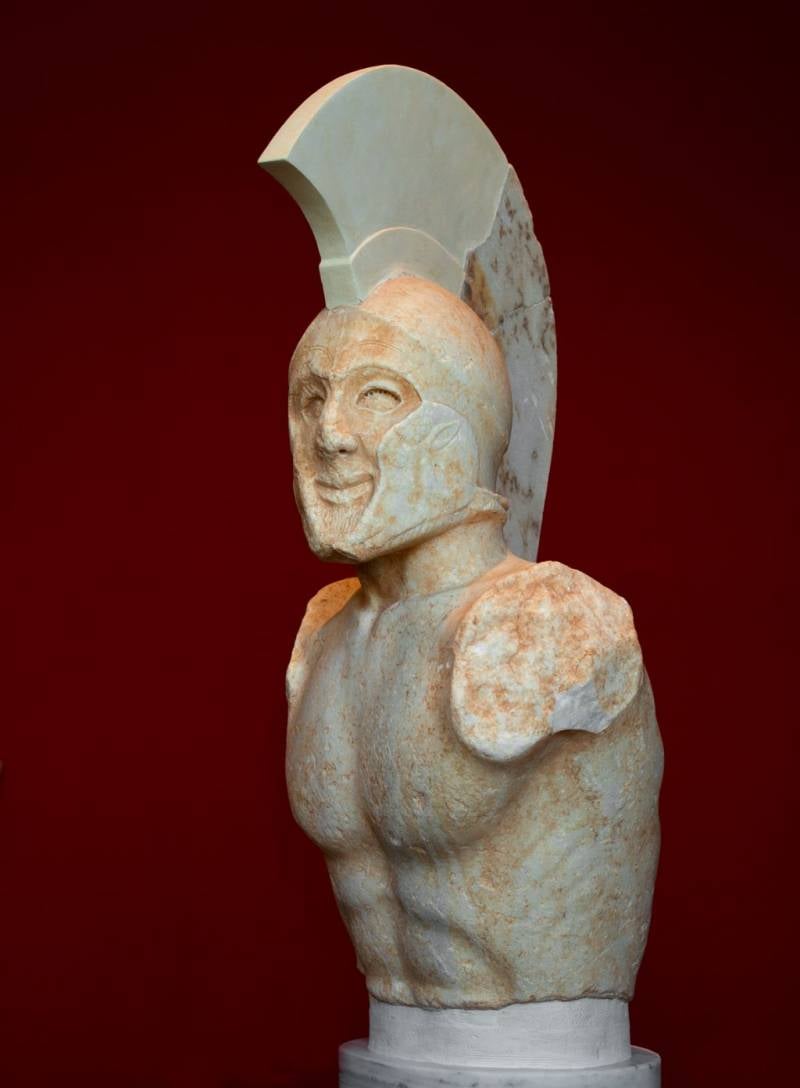 [/ Center]
[/ Center]And the word "shield" in the name of these soldiers is not at all accidental. The fact is that with a shield, standing in the ranks of the hoplites, he covered not only himself, but also his comrades:
On shields, the Spartans carried the dead and wounded after the battle. Therefore, the traditional parting words of the Spartiat, going on a campaign, were the words: "With a shield, or on a shield." The loss of a shield was a terrible crime, which could even be followed by deprivation of citizenship.
The young periki, not trained in agels, in the Spartan army were used as auxiliary light infantry. In addition, the Spartiats were accompanied by the Helots in the campaigns - sometimes their number reached seven people per Spartan. They did not take part in hostilities, were used as servants - they performed the duties of porters, cooks, orderlies. But in other policies, porters, carpenters, potters, gardeners and cooks were given weapon and put into operation the hoplites: it is not surprising that in Sparta they were contemptuous of such armies - both enemy and allied.
But sometimes the Spartans had to include slugs in the auxiliary infantry units. During the Peloponessian War, the number of freed helots in the Spartan army reached 2-3 thousand people. Some of them were even then trained in phalanx actions and became hoplites.
In the march, the Spartan army was accompanied by flutists, who played their marches during the battle:
Clothing, Spartans, going to the campaign, traditionally was red - so that it was not visible blood. Before the battles, the king offered the first sacrifice to the Muses, "so that the story about us would be worthy of our exploits" (Eudamid). If there was an Olympic champion in the Spartan army, he was given the right to be near the king during the battle. The service in the cavalry in Sparta was not considered prestigious, for a long time cavalrymen recruited those who could not serve as a hoplite. The first mention of the Spartan cavalry refers only to 424 BC, then 400 horsemen were recruited, which were used mainly to protect the phalanx. In 394 BC The number of cavalrymen in the Spartan army increased to 600.
Victory in Greece was determined by the arrival of a messenger from the party who had acknowledged defeat, who conveyed a request for an armistice to collect the corpses of the soldiers. Curious story occurred under the Fire in 544 BC. Then, by agreement of the Spartans and Argostsy, 300 soldiers entered the battle: the disputed area was to be left to the winners. By the end of the day, the 2 of the Argoss and the 1 Spartan survived. Argos, considering themselves the victors, left the battlefield and set off Argos to please the fellow citizens with the news of victory. But the Spartan warrior remained in place, and his compatriots regarded the withdrawal of opponents from the battlefield as flight. Of course, the Argos did not agree with this, and the next day the battle of the main forces of Argos and Sparta, which the Spartans won, took place. Herodot argues that from this time the Spartiats began to wear long hair (they had cut it shortly before), and the Argossians, on the contrary, decided to cut their hair shortly until they could win Theria.
At the turn of the VI-V century. BC. Argos was the main rival of Lacedaemon in the Peloponnese. Tsar Cleomenes I finally defeated him. When, after one of the battles, the retreating Argossians tried to hide in the sacred grove and the main temple of the country located in it, he without hesitation ordered his escorts to burn the grove. Later, Cleomenes interfered in the affairs of Athens, expelling the tyrant Hippius (510 BC) from there, and in 506 BC. captured Eleusis and even planned to take Athens to include Attica in the Peloponessian Union, but was not supported by his rival, the king-Eurifontide Demarat. Cleomenes didn’t forgive Kleomen: later, in order to declare him an illegitimate, he forged a Delphic oracle. Having achieved the removal of Demarata, Cleomenes with the new king Leotihid conquered the island of Aegina. Demarat fled from Sparta to Persia. But all these exploits did not save Cleomenes when the deception revealed with a fake Delphic oracle. This was followed by the events described in the first part: the flight to Arcadia, the inglorious death after returning to Sparta - we will not repeat. Once again, I returned to these events to report that Leonid, who was destined to become famous in Thermopylae, became the successor of Cleomenes.
But back a bit.
After the conquest of Messenia, Sparta took the next and very important step towards hegemony in Hellas: around 560 BC. she defeated Tegea, but did not turn her citizens into helots, but convinced them to become allies. Thus, the first step was taken in the creation of the Peloponessian Union - a powerful unification of the Greek states, headed by Sparta. The next ally of Lacedaemon was Elida. Unlike the Athenians, the Spartians did not take anything from their allies, demanding from them only auxiliary troops during the war.
In 500 BC rebelled under the rule of Persian king Darius I, the Greek cities of Ionia, in the next year (499) they turned to Athens and Sparta for help. It was impossible to quickly deliver a sufficiently large military contingent to Asia Minor. And, therefore, it was impossible to provide real assistance to the rebels. Therefore, the Spartan king Cleomenes I wisely refused to participate in this adventure. Athens sent 20 their ships to the aid of the Ionians (another 5 was sent by the Eberea city of Eberea). This decision had tragic consequences and caused the famous Greek-Persian wars, which brought Hellas citizens a lot of grief, but glorified several Greek commanders, the Athenian messenger Philippides, who ran a marathon distance (according to Herodotus, he also ran to Sparta in 24 hours 1240 Stadiums - over 238 km) and whole 300 Spartans. In 498 BC the rebels burned the capital of the Lydian satrapy - Sardis, but then suffered a defeat at the island of Lada (495), and in 494 BC. the Persians took Miletus. The uprising in Ionia was brutally crushed, and the gaze of the Persian king turned to Hellas, who dared to challenge his empire.
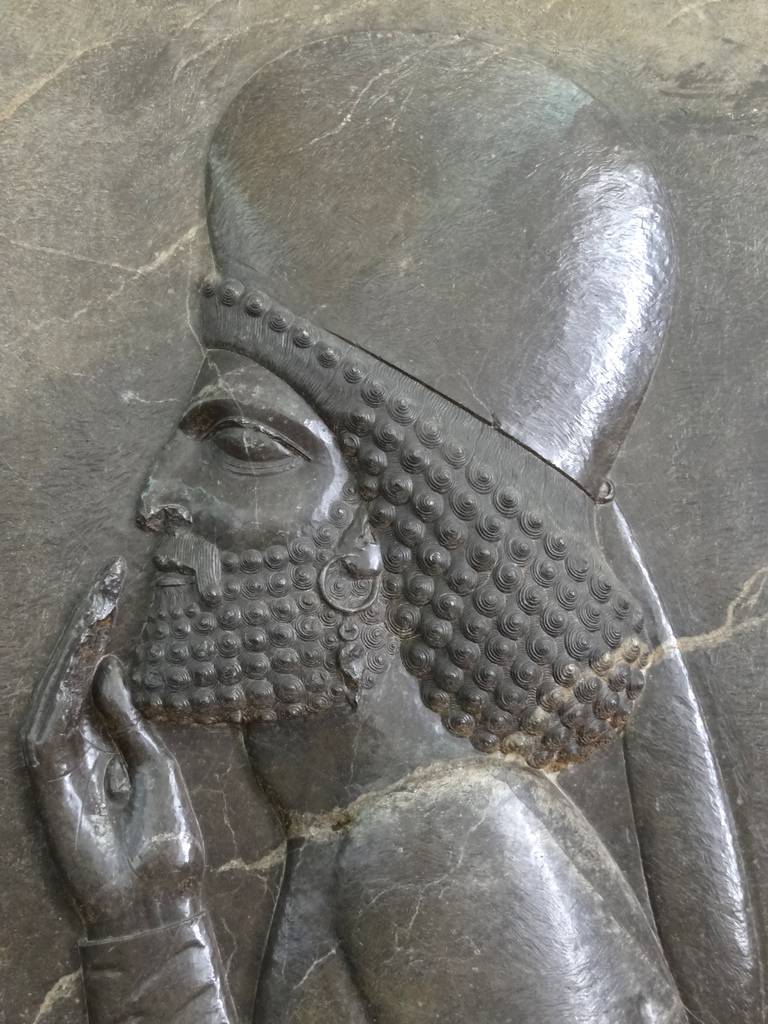
In 492 BC the hull of the Persian commander Mardonius conquers Macedonia, but the Persian fleet dies during a storm at Cape Athos, a campaign against Hellas fails.
In 490 BC the army of king Darius landed at Marathon. The Spartans, who celebrated the Dorian holiday in honor of Apollo, were late to the beginning of the battle, but this time the Athenians managed without them, having won one of the most famous victories in world history. But these events were only the prologue of a great war. In 480 BC The new Persian king Xerxes moved a huge army to Greece.
[center] Persian Warriors
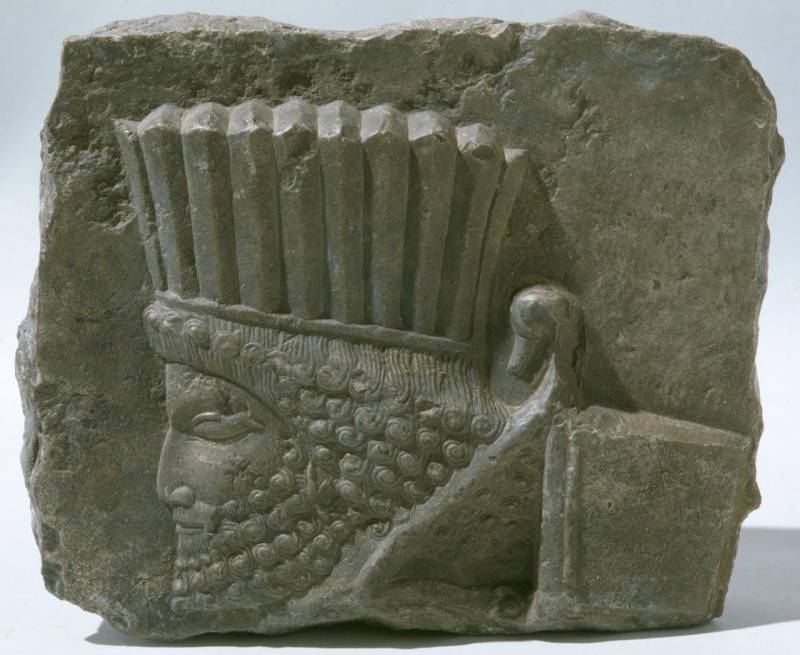 [/ Center]
[/ Center]The military adviser to the Persian king got a rival of Clehomen's Achaean - Evripontid Demarat. Fortunately for Greece, the Xerxes, confident in the strength of his troops, did not listen too much to the advice of the tsar-renegade. It must be said that, in contrast to the Agiads, who traditionally led the anti-Persian party in Sparta, the Euripontids treated Persia more favorably. And it is difficult to say how the history of Hellas would have happened if Demarth had won in Sparta, not Cleomenes.
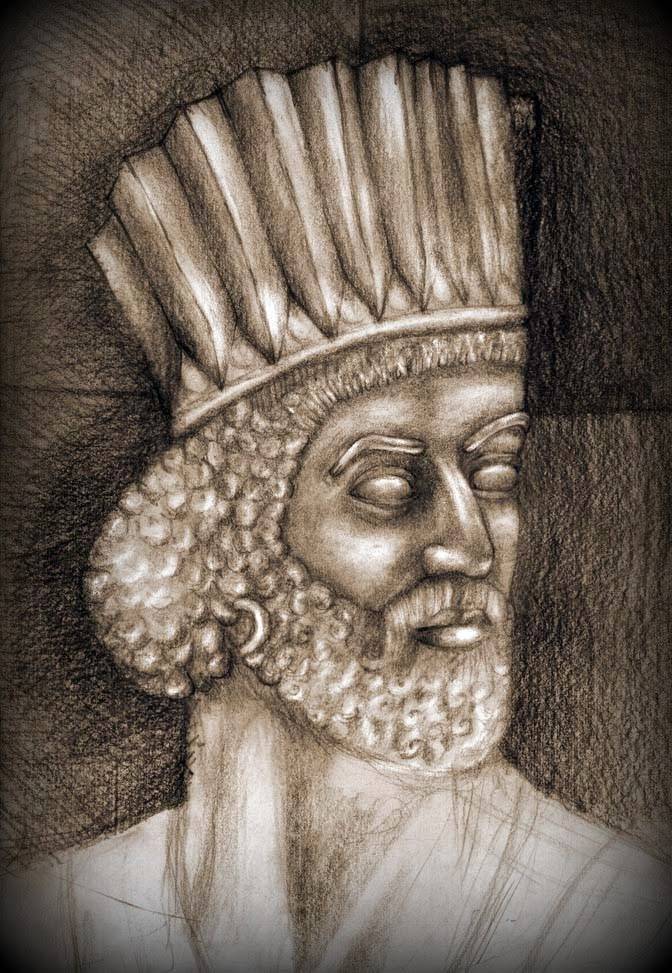
The army of Xerxes was enormous, but it had significant drawbacks - it was made up of disparate parts and it was dominated by lightly armed units that could not fight on an equal footing, with those who had learned to keep a good system, disciplined Greek hoplites. In addition, the Persians had to go through the Fermopilsky passage (between Thessaly and Middle Greece), the width of which in the narrowest point did not exceed 20 meters.
In the 7 book of his "Stories" ("Polyhymnia"), Herodot writes:
It was a great chance that the Greeks did not take full advantage of. The Spartan Dorians at this time celebrated a holiday in honor of their main god, Apollo, whose cult they once brought to Laconia. Not even a part of his army was sent to Athens. To Thermopylae went the king-hagiad (Aheyan) Leonid with whom they released all 300 soldiers. Probably, it was Leonid's personal squad: the hippies were bodyguards, relying on every king of Sparta. Perhaps they were descendants of the Achaeans, for whom Apollo was a strange god. Also about a thousand lightly-armed peireks marched. They were joined by several thousand soldiers from different cities of Greece.
Herodotus says:
The total number of Leonid's army as a result was from 7 to 10 thousand people. The rest is well known: the hoplites, who had taken refuge behind a wall made of large stones, very successfully restrained the attacks of the Persian troops, occasionally turning into a counterattack — until the news came that the Greek detachment was bypassing some kind of goat path. The man, thanks to whose betrayal the Persians bypassed Leonid's detachment, was called Ephialtes (this word in Greece then began to mean “Nightmare”). Without waiting for the award, he fled from the Persian camp, was later outlawed and killed in the mountains. Blocking this path was even easier than the Thermopil Pass, but the Allies of the Spartans were in a panic. They said that Leonid let them go so as not to share a glorious death with anyone, but, more likely, they left, not wanting to die. The Spartans did not leave, because the shame was afraid of more death. In addition, over Leonid predicted that in the upcoming war or the Persian king conquer Sparta, or the Spartan king perish. And then the predictions were taken more than seriously. Sending Leonid with such small forces to Thermopylae, geronts and Efors, in effect, secretly ordered him to die in battle. Judging by the orders that Leonid gave to his wife, going on a campaign (to find a good husband and give birth to sons), he understood everything correctly and already then made his choice, sacrificing himself to save Sparta.
Unfortunately, the Laceqemona and the Thespians, who remained with the Spartiates and were also killed in an unequal battle, are almost forgotten now. Diodorus reports that the Persians threw the last Hellenic warriors with spears and arrows. Archaeologists found a small hill in Thermopylae, literally strewn with Persian arrows - apparently it was the last position of Leonid's detachment.
Total Greeks in Thermopylae lost about 4000 people. But the Spartans did not die 300, but 299: a warrior named Aristodemus fell ill on the way and was left in the Alpenes. When he returned to Sparta, they stopped talking to him, the neighbors did not share water and food with him, since then he was known by the nickname “Aristodem the Coward.” He died a year later at the battle of Plataeus - and he himself sought death in battle. The loss of Persians, Herodotus estimates in 20 000 people.
In 480 BC the famous naval battle of Salamis took place. For some reason, the entire glory of this victory is attributed to the Athenian Themistocles, however united fleet Greece in this battle was commanded by the Spartan Euribiad. The linguistic self-PR man Themistocles (future traitor and defector) under the laconic and business Eurybias played the role of Furmanov under Chapaev. After the defeat, Xerxes with most of his army left Hellas. In Greece, the corps of his relative Mardonius, numbering about 30, remained. Soon his army was replenished with fresh units, so that at the time of the Battle of Plataea (a city in Boeotia) he had about 000 soldiers. The base of the Greek army was about 50 soldiers from Athens and 000 Spartiates. In addition, the Spartans went on to attract helots into their army, who were promised release in case of victory. Pausanias became the commander of the Greek army - not the king, but the regent of Sparta.
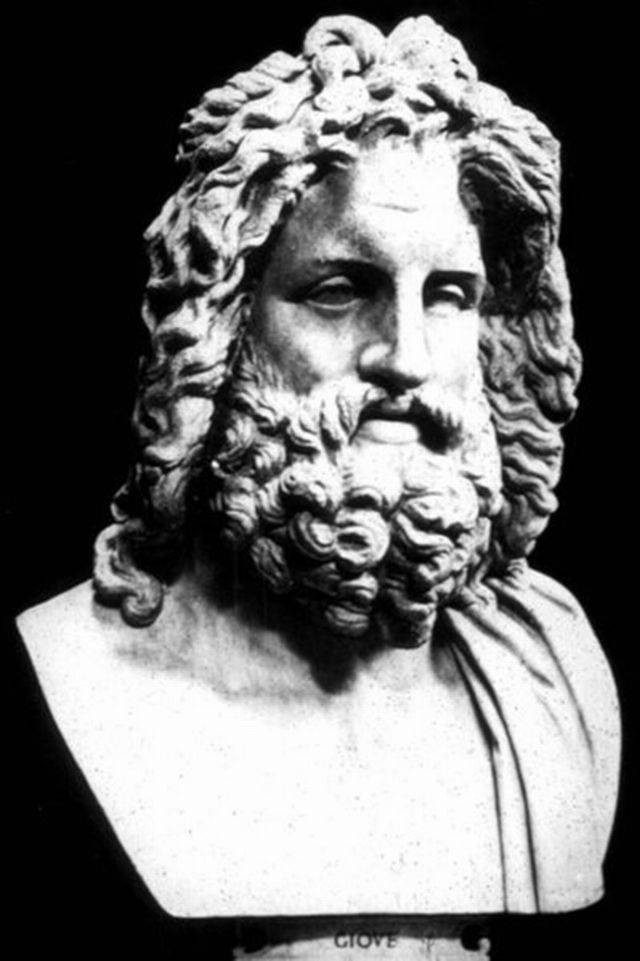
In this battle, the Spartan phalanx literally ground the army of the Persians.
Mardonius died, but the war continued. The fear of the invasion of a new, no less strong, army of the Persians was so great that a general Greek alliance was created in Hellas, led by Pausanias, the hero of the battle of Plathias. However, the interests of Sparta and Athens were too different. In 477, after Pausanius’s disgraceful death, which the Ephors suspected of striving for tyranny, Sparta went out of the war: Peloponnesus and Greece were freed from the Persian forces, and the Spartists no longer wanted to fight outside Hellas. Athens and the Delian (Maritime) Union headed by them, which included the cities of Northern Greece, the Aegean islands and the coast of Asia Minor, continued to fight the Persians until 449 BC, when Kalliw peace was concluded. The most prominent commander of the Delianian Union was the Athenian strategist Kimon. Sparta also stood at the head of the Peloponnesian Union - the confederation of policies of southern Greece.
The tragic events of 465 BC contributed to the cooling of Sparta’s relations with Athens, when Sparta was almost completely destroyed after the terrible earthquake, many of its citizens died. Chaos, at the time of the reign of Lacedaemon, caused an uprising in Messenia, during which more 300 Spartists were killed. The revolt of the ilot was suppressed only after 10 years, the scale of the hostilities was such that it was even called the III Messenian War. Lacedaemon was forced to seek help from Athens, and Sparta’s great friend Kimon persuaded his fellow citizens to provide assistance. However, the authorities of Sparta suspected the arriving Athenian troops were sympathetic to the rebels, and therefore refused to help. In Athens, this was considered an insult, the enemies of Lacedemon came to power there, and Kimon was expelled from Athens.
In 459 BC there was the first military clash between Sparta and Athens - the so-called Small Peloponessian War began, which consisted of periodic clashes in disputed territories. Meanwhile, in Athens, Perikles came to power, who, having finally taken over the treasury of the Union of Delos, used these funds to build the Long Walls - from Piraeus to Athens, and this could not but disturb Sparta and its allies.
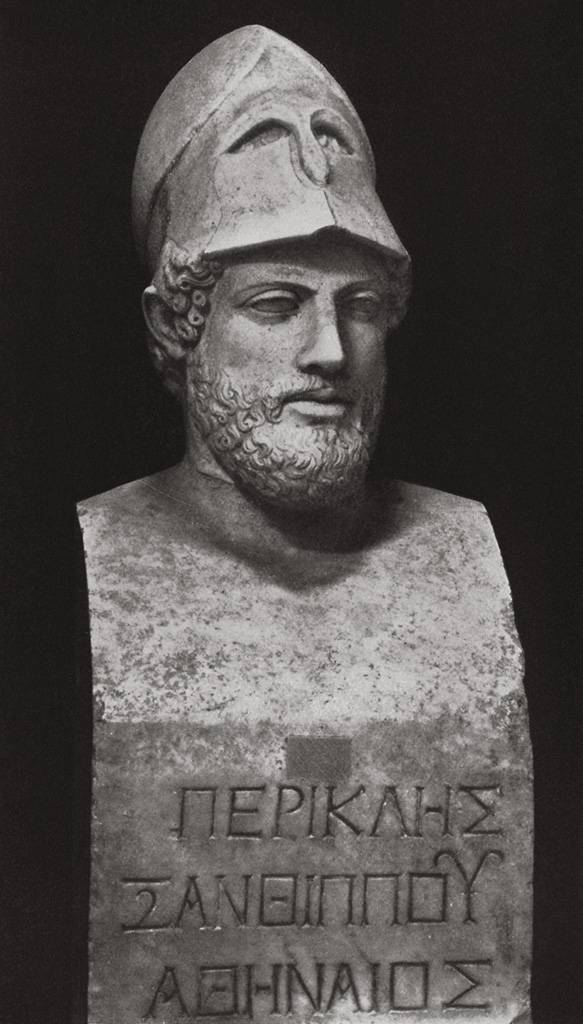
Reigning at sea, the Athenians launched a trade war against Corinth and organized a trade boycott of daring to support the Corinthians Megara. Protecting their allies, Sparta demanded that the naval blockade be lifted. Athens in response put forward a mocking demand for independence for the cities of Periek. As a result of the invasion of Spartans in Attica 446, the First Peloponessian War began, which ended with a truce concluded on the initiative of Athens - that is, the victory of Sparta. Despite the defeat, the Athenians pursued an active expansionist policy, expanding their influence and disturbing the city of the Peloponessian Union. The leaders of Sparta understood how difficult it was to fight Athens without having a strong fleet of their own, and in every way delayed the war. However, yielding to the demands of its allies, in 431 BC The Spartiats again sent their army to Athens, intending, as usual, in open combat, to crush the army of the Delian Alliance - and they did not find the enemy's army. By order of Pericles, more than 100 000 people from the vicinity of Athens were taken away behind the walls, which the Spartans could not storm. The discouraged partisans returned home, but the following year they were helped by the plague, which killed up to a third of the population of Athens, including Pericles. The quivering Athenians offered peace, which the Spartans haughtily refused. As a result, the war took a protracted and extremely tedious character: 6 years of victory on one side were replaced by its defeats, the treasury of the opponents was exhausted, reserves melted, and no one could prevail. In 425, a storm brought the Athenian ships to the unprotected Messenian port of Pylos, which they captured. The Spartans who came in, in turn, occupied the small island of Sfakteriya, opposite Pylos - and were blocked by other ships that came to rescue from Athens. The hunger-bearing garrison of Sfakteriya surrendered to the Athenians, and this not-too-significant incident made a great impression on all of Hellas - because, among others, 120 partisans were captured. Until that day, no one - neither enemies, nor friends, believed that a whole detachment of Sparta warriors could lay down their arms. This capitulation, it seemed, broke the spirit of proud Sparta, which was forced to conclude a peace treaty - beneficial to Athens and humiliating for itself (Nikiyev World). This treaty caused displeasure among the powerful allies of Sparta — Boeotia, Megara, and Corinth. In addition, Alcibiades, who came to power in Athens, was able to conclude an alliance treaty with Arqueos, a long-time rival of Lacedaemon in Peloponnese.
This was already too much, and 418 BC. hostilities were resumed, and again, as in the days of the II Messenic War, Sparta was on the verge of death, and only victory in the battle of Mantiney rescued Lacedemon. About this battle Thucydides wrote that the Spartans in him "brilliantly proved their ability to win with courage." The Mantinean allies of Argos fled the left wing of the Spartan army, where the Skyrians stood - the mountain men Perieks (Thucydides writes that they were "in that place to which only one of the Lacedaemonians are entitled") and the warriors under the command of the good general Brasid, the initiative of which the army was introduced lightweight armor. But on the right flank and in the center, “where did King Agis stand with 300 bodyguards, called hippies” (remember 300 of King Leonid’s Spartans?) Was won by the Spartians. The Athenian troops of the left flank, already almost surrounded, escaped defeat only because Agis "ordered the whole army to go to the aid of the defeated units" (Thucydides).
And the events in the Peloponessian war suddenly followed a completely unimaginable phantasmagoric scenario. In 415 BC Alcibiades persuaded the citizens of Athens to organize a costly expedition to Sicily - against the Allied Sparta of Syracuse. But in Athens suddenly all the statues of Hermes were defiled, and for some reason Alcibiades was accused of this blasphemy. For what reason, and why, had to deal with such things, dreaming about the military glory of Alcibiades on the eve of the grand maritime voyage organized by him with such difficulty, it is completely incomprehensible. But Athenian democracy was often cruel, merciless, and irrational. Insulted Alcibiades fled to Lacedaemon and obtained help there besieged Syracuse. The Spartan commander Gilipp, who led the entire 4 ship to Syracuse, led the defense of the city. Under his leadership, the Sicilians destroyed the Athenian fleet of 200 ships and an invasion army numbering about 40 thousands. Next, Alcibiades advises the Spartans to take the Decalea - the area north of Athens. 20 000 belonging to the rich Athenian slaves go to the side of Sparta and the Delian Union begins to disintegrate. But while the Spartan king Agis II is fighting in Attica, Alcibiades seduces his wife Timaeus (no love at all, nothing personal: I just wanted his son to be the king of Sparta). Fearing the wrath of a jealous husband, he flees to Persian Asia Minor. Sparta needs a fleet for the final victory in the war, but there is no money for its construction, and the Spartiats turn to Persia for help. However, Alcibiades convinces the ruler of Asia Minor Tissafern that it would be beneficial for Persia to allow the Greeks to exhaust themselves in endless wars. The Spartans still collect the necessary amount, build their fleet - and Alkibiades returns to Athens to regain the post of commander-in-chief. In Lacedaemon, the star of the great Spartan commander Lysander, who in 407 BC, rises at this time. practically destroys the Athenian fleet in the battle at Cape Notiy.
Alcibiades was absent and the Athenian fleet was commanded by the navigator of his ship, who entered the battle without permission - but Alcibiades was again driven out of Athens. Through 2 of the year, Lysander captured almost all the Athenian ships in the Battle of EGOSPOTA (only 9 managed to escape with trire, the Athenian strategist Konon fled to Persia, where he was assigned to oversee the construction of the fleet). In 404 BC Lysander entered Athens. So ended the 27-year Peloponessian War. Athens with its "sovereign democracy" so got everyone in Hellas, that Corinth and Thebes demanded to level the city hated by the Greeks with the land, and to convert the population of Attica into slavery. But the Spartans only ordered the Long Walls that connected Athens to Piraeus to be demolished, and left all the 12 ships defeated. In Lacedaemon, they were already afraid of strengthening Thebes, and therefore the Spartiates spared Athens by trying to make them members of their union. Nothing good came of it, as early as 403 BC. the rebellious Athenians overthrew the pro-partly government, which went down in history as 30 tyrants. And Thebes, in fact, sharply intensified, and concluding an alliance with Corinth and Argos, in the end, crushed the power of Sparta. The last great commander of Sparta, King Agesilaus II, still successfully fought in Asia Minor, defeating the Persians near the city of Sardis (the Greek mercenaries Cyrus the Younger, as well as their commander Xenophon, fought in his army). However, the Corinthian War (against Athens, Thebes, Corinth and the policies of the Aegean Sea, supported by Persia - 396-387 BC), forced Agesilaus to leave Asia Minor. At the beginning of this war, his former mentor died, and now his rival Lysander. Athenian Konon and tyrant of Salamis (city in Cyprus) Evagor defeated the Spartan fleet at Knid (394 BC). After this, Konon returned to Athens and restored the famous Long Walls. The Athenian strategist Iphicrates, who developed the ideas of Brasid (added light swords and spears to the light armor, as well as darts: a new kind of military force came out - pelttes), defeated the Spartans at Corinth in 390 BC.
But Agesilaus on land and Antikalid at sea were able to achieve an acceptable result in this unsuccessfully begun war. In 386 BC Royal Peace was concluded in Susa, which proclaimed the complete independence of all Greek policies, which meant unconditional hegemony in Hellas of Sparta.
However, the war with the Boeotian alliance, whose troops were commanded by Epaminondas and Pelopid, ended in disaster for Sparta. In the battle of Levktrach (371 BC), the previously invincible Spartan phalanx was defeated by a new tactic (slanting military formation), invented by the great Theban commander Epaminondas. Until then, all the battles of the Greeks were of a "duel" character: the strong right flank of the opposing armies pressed on the weak left wing of the enemy. The one who first overturned the left flank of the enemy army won. Epaminondas strengthened his left flank, incorporating a select Holy Squad of Thebes into it, and a weakened right flank pulled back. At the site of the main attack, the Theban phalanx in 50 ranks broke through the formation of the Spartan phalanx, which traditionally consisted of 12 ranks, King Cleombrot died along with a thousand hoplites, 400 of whom were Spartiates. It was so unexpected that the Spartans subsequently justified their defeat by the fact that Epaminond "fought not by the rules." The result of this defeat was the loss of Sparta Messenia, which immediately undermined the resource base of Lacedaemon and, in fact, led him out of the great powers of Hellas. After this defeat, the enemy army laid siege to Sparta for the first time. He headed the remnants of his troops and civilian militia Agesilaus managed to defend the city. The Spartans were forced to make an alliance with Athens, the war with Thebes continued for many years. The son of Agesilaus, Archidamus, defeated the forces of the Argassians and the Arkadyans in a battle that was called “useless” by the Spartans, because not a single spartiat died in it. In response, Epaminondas, taking advantage of the fact that Agesilaus and his troops went to Arcadia, made another attempt to seize Sparta. He managed to break into the city, but was knocked out by detachments of Arkhidam and Agelessaya. Thebans moved to Arcadia, where in 362 BC the city of Mantinea hosted the decisive battle of this war. Epaminondas tried to repeat his famous maneuver, focusing on the impact of the built in a dense and powerful “echelon” of the left flank. But this time the Spartans stood to the death and did not retreat. Epaminond, who personally led this attack, was mortally wounded when he heard that all his closest comrades were also killed, he ordered to retreat and make peace.
This battle was the last that Agesilaus gave on the territory of Greece. He very successfully took part in the wars of applicants for the Egyptian throne and died of old age, on the way home. At the time of his death, Agesilaus was already 85 years old.
Hellas was exhausted and ravaged by constant wars, and born around 380 BC The Greek historian Theopompus wrote a perfectly fair pamphlet "The Three-headed." In all the misfortunes that hit Hellas, he blamed the "three heads" - Athens, Sparta, Thebes. Exhausted by endless wars, Greece became easy prey for Macedonia. The troops of Philip II defeated the combined army of Athens and Thebes in the battle of Heronei in 338 BC. The Macedonian king successfully used the invention of Epaminondas: the retreat of the right flank and the decisive attack of the left, ending with the flanking blow of the phalanx and the cavalry of Tsarevich Alexander. In this battle, was defeated and the famous "Sacred squad of Thebes", which, according to Plutarch, consisted of 150 homosexual couples. The great homosexual legend says that the Thebans lovers fought the Macedonians to the end so as not to survive the death of their “husbands” (or “wives”) and all, as one, fell on the battlefield. But in a mass grave found in Heronei, the remains of only 254 people were found. The fate of the remaining 46 is unknown: it is possible that they retreated, perhaps they surrendered. This is not surprising. The word “homosexual” and the phrase “a person who is forever in love with his partner and remains faithful to him throughout his life” are not synonymous. Even if some romantic feelings at first took place in these couples, some of the soldiers of this detachment, of course, already had a relationship with their “lover” appointed by the city authorities (“divorce” and the formation of a new couple in this combat unit was hardly possible) . And, given the more than the tolerant attitude of the Boeotians to gays, it is quite possible that they already had other partners "on the side". Nevertheless, the battle on this site was indeed extremely fierce, Plutarch reports that Philip II, seeing the bodies of the dead Thebans of the “Sacred Squad” and finding out what principle he had formed, said: “Let the one who suspects that they did something wrong. " Philip clearly doubted something. Maybe he doubted the unconventional orientation of these brave Thebans - after all, the king was not Hellenic, but Macedonian, while the barbarians, according to a number of Greek historians, did not approve of homosexual relations and condemn. But perhaps he did not believe that the courage of the warriors was associated precisely with their sexual preferences, and not with love for their homeland.
In 7 years, the turn of Sparta came: in 331 BC. Macedonian commander Antipater defeated her army in the battle of Megaloprol. In this battle, about a quarter of all full-fledged Spartiates and King Agis III died. And it was not the same Sparta that before. At the beginning of the 5th century BC Sparta could set 8 to 10 to thousands of hoplites. In the battle of Plateia against the Persians, 5 of thousands of Spartians rose. During the war with the Boeotians' council, Sparta could mobilize a little more than 2000 soldiers from among full citizens. Aristotle also wrote, wrote that in his time Sparta could not expose thousands of hoplites.
In 272, Sparta had to endure the siege of Pyrrus returning from Italy: he was brought to Lacedaemon by the youngest son of the former king, Cleonim, who contested the power of his nephew. Spartiats did not bother to build solid walls by that time, but women, old people and even children dug a ditch and built an earthen wall fortified with carriages (the men did not participate in the construction of these fortifications to save forces for battle). For three days, Pierre stormed the city, but failed to take it, and, having received an advantageous (as it seemed to him) offer from Argos, he moved north to meet his death.
Inspired by the victory over Pyrrhus himself, the Spartiates followed him. In the rearguard battle killed the son of the king of Epirus, Ptolemy. On the further events, Pausanias tells the following: “Having already heard about the death of his son and shocked by grief, Pyrrhus (led by Molossian cavalry) was the first to rush into the ranks of the Spartans, seeking to kill with greed for revenge, and although in battle he always seemed scary and invincible, but this once with his audacity and strength he eclipsed everything that happened in previous battles ... Jumping off the saddle, in a foot battle, he laid down his entire selective squad beside Evalk. After the end of the war, excessive ambition of its rulers led Sparta to such senseless losses. ”
More about this in the article. Shadow of the great Alexander (Ryzhov V.A.).
In the III century BC. Hellas was torn to pieces by three rival forces. The first was Macedonia, which claimed power in Greece from the time of its conquest by Alexander the Great. The second is the Achaean Union of the Peloponessian policies (which embodied the practice of dual citizenship - the policy and the all-union), supported by the Egyptian Ptolemaic dynasty. The third is the Aetolian Union: Central Greece, part of Thessaly and some of the Peloponnese policies.
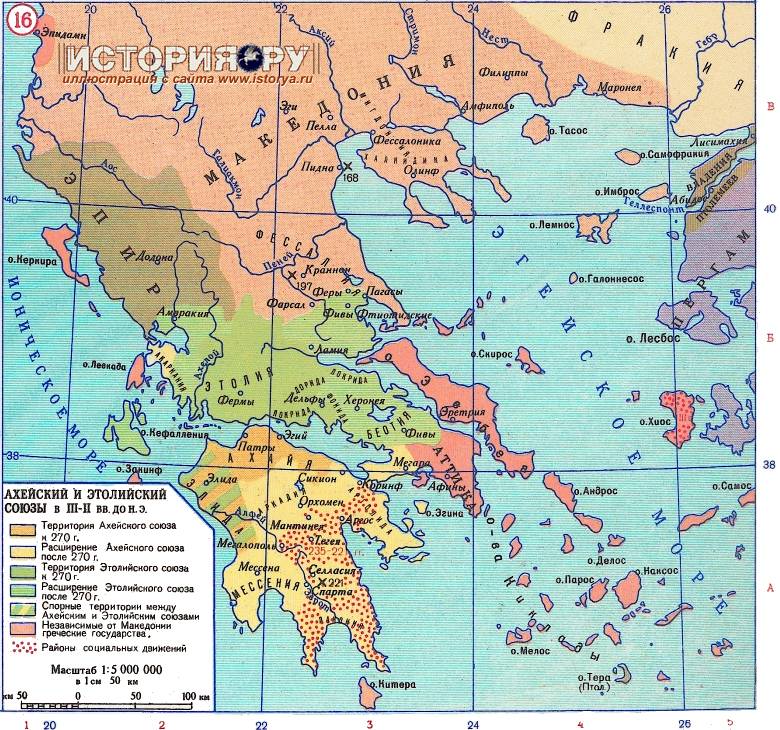
The clash with the Achaean alliance became fatal for the losing power of Sparta. The defeats of the king-reformer army of Cleomen III in the Battle of Selascia in 222 до н.э. and the troops of tyrant Nabis in 195 до н.э. finally finished off the Lacedaemon. A desperate attempt by Nabis to seek help from the Aetolians ended with his killing by "allies" in 192. до н.э. Weakened Sparta could not afford to be completely independent, and was forced to join the Achaean Union (in 192-191). BC) - along with Messenia and Elis. And in the II. до н.э. a new, young and strong predator came to the fields of old battles - Rome. In the war against Macedonia (started in 200 BC) it was first supported by the Aetolian Union (199), then by the Achaeans (198). Having overcome Macedonia (197 BC), the Romans solemnly declared all the Greek cities free during the Isthmian Games. As a result of this “release,” already in 189. до н.э. Aetolians were forced to submit to Rome. In 168 was до н.э. Rome finally defeated Macedonia, and it was precisely the victory over the king of this country, Perseus near the city of Pydna, Polybius called "the beginning of the world domination of the Romans" (after all, Carthage still stood). After 20 years (in 148 BC) Macedonia became a province of Rome. The Achaean alliance lasted the longest, but it was destroyed by “imperial” ambitions and injustice towards its neighbors. Sparta entered the Achaean Union forcedly and against her will, but retained the right to disobey the Achaean court and the right to independently send embassies to Rome. In 149 was до н.э. Achaeans, confident of Rome’s gratitude for helping to suppress the Macedonian uprising led by an impostor who pretended to be the son of the last king Perseus, abolished the privileges of Sparta. In the ensuing short war, their army defeated a small army of Lacedemona (the Spartiates lost 1000 people). But Rome no longer needed a rather strong unification of the polis in Greece, and taking advantage of the excuse, he hurried to weaken his recent allies: he demanded the exclusion from the Achaean alliance of “cities unrelated to the blood of Achaeans” - Sparta, Argos, Orhomen and Corinth. This decision provoked a violent protest in the union, the beatings of the Spartans and the “friends of Rome” began in different cities, the ambassadors of Rome were greeted with ridicule and insult. The Achaeans could not have done anything more stupid, but “whom the gods want to destroy, they deprive the mind of those”. In the Corinthian (or Achaean) War, the Achaean Alliance suffered a crushing defeat - 146 до н.э. Taking advantage of the occasion, the Romans destroyed Corinth, whose merchants still dared to compete with the Romans. In the same year, by the way, Carthage was destroyed. After that, the province of Achaia was formed in Greece. Together with the rest of the cities of the Achaean Union, lost its independence and Lacedaemon, for which the Romans “stood up”. Sparta has become a little remarkable provincial city of the Roman Empire. In the future, Sparta in turn captured the Goths, Heruli and Visigoths. Finally, the ancient Sparta fell into decay after the IV Crusade: it was not interesting to the new owners, they built nearby their city - Mystra (in 1249).
After the conquest of the Ottomans, the last remaining Greeks were driven into the foothills of Tayget. Nowadays the existing city of Sparta was founded in 1834 - it was built on the ruins of the ancient city according to the design of the German architect Jokhmus. Currently, a little more than 16 thousand people live in it.
- Ryzhov V.A.
- This is Sparta! Part I (Ryzhov V.A.)
The collapse of the empire of Alexander the Great (VA Ryzhov)
Shadow of the great Alexander (Ryzhov V.A.)
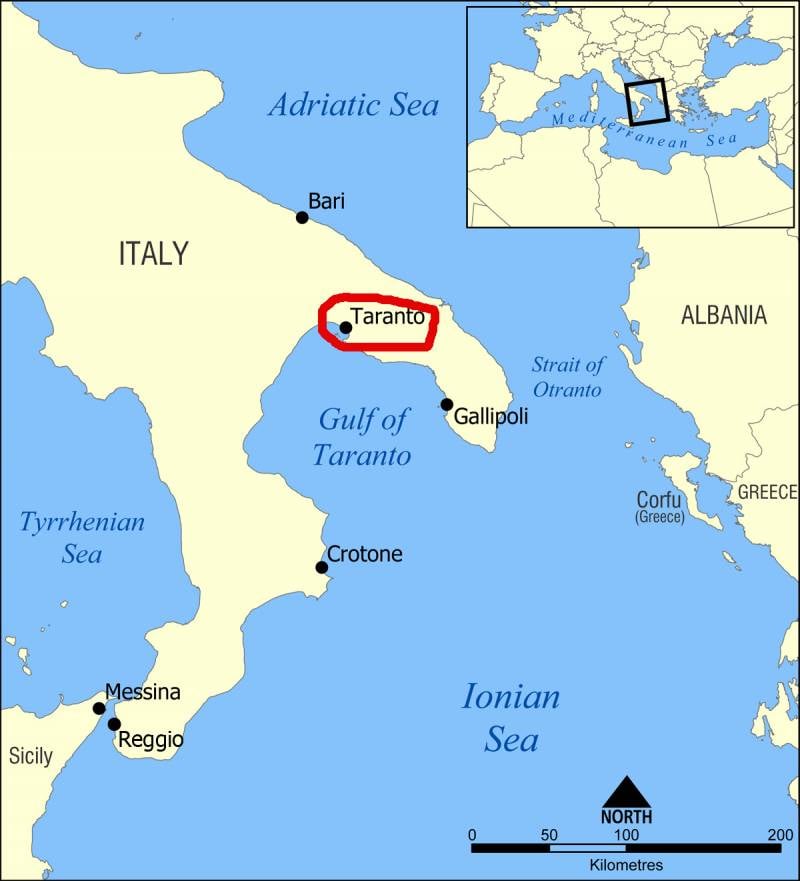
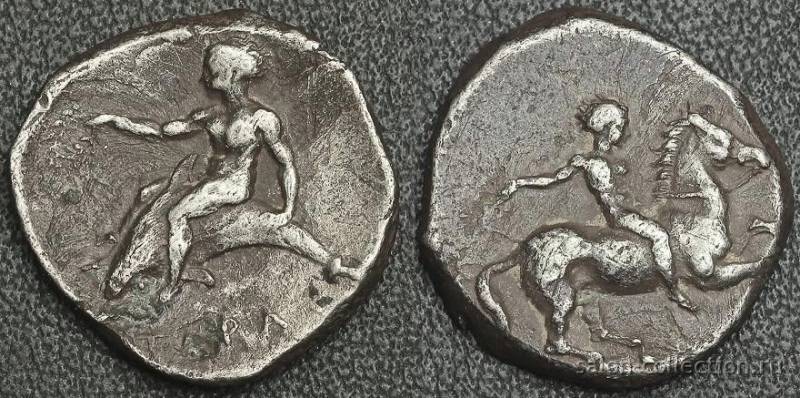
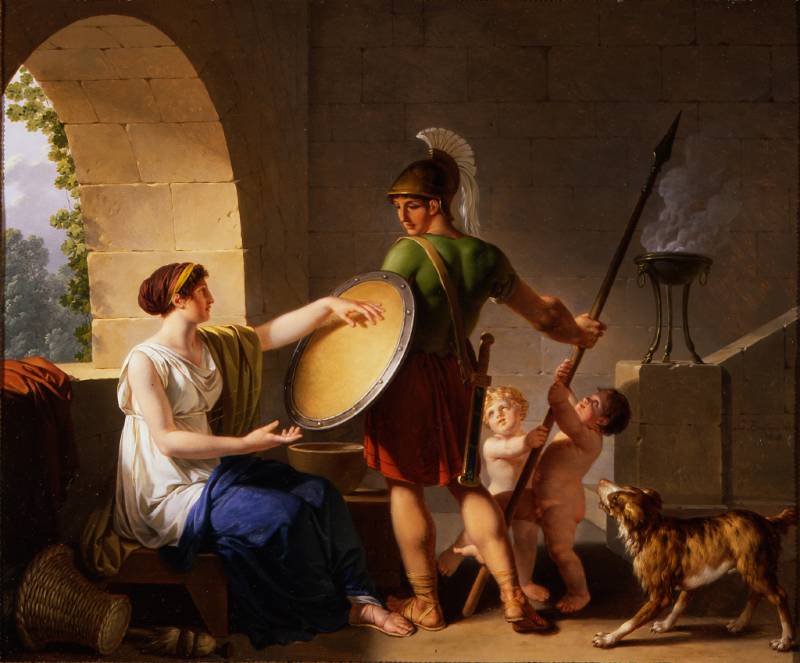
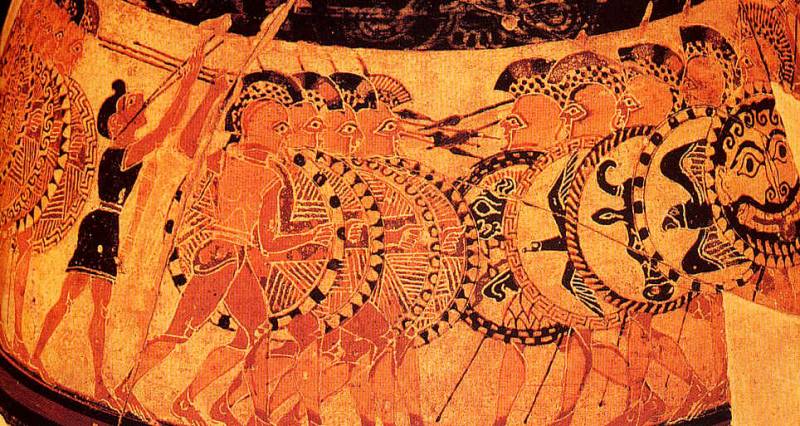
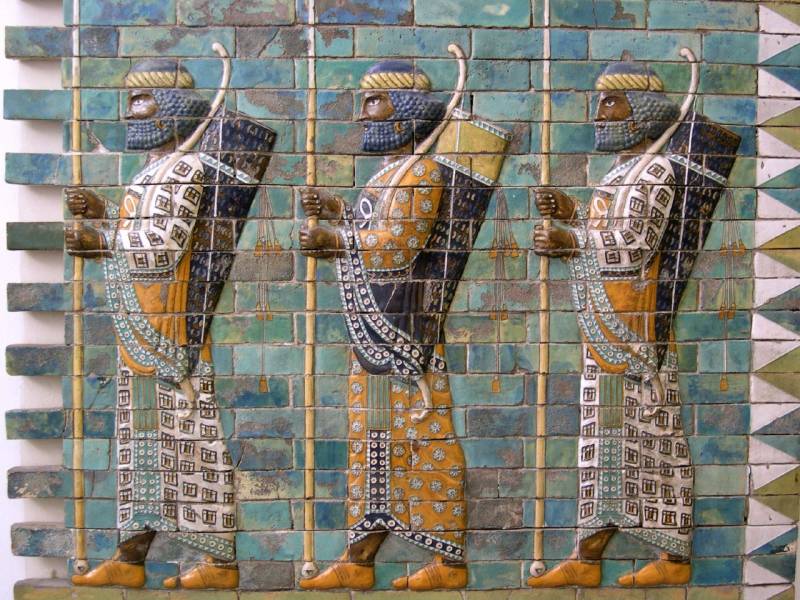
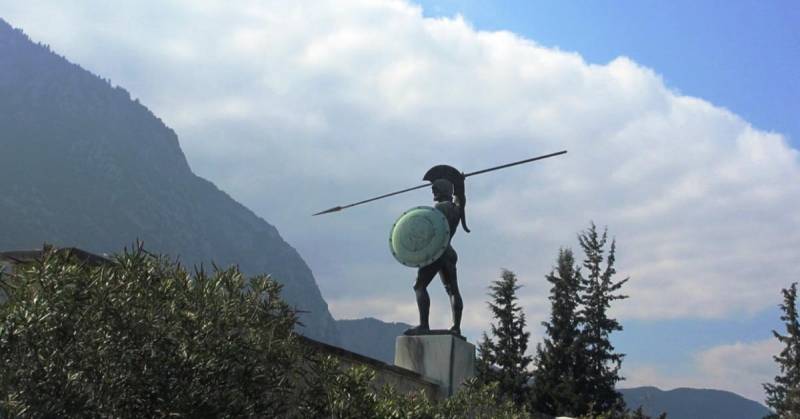
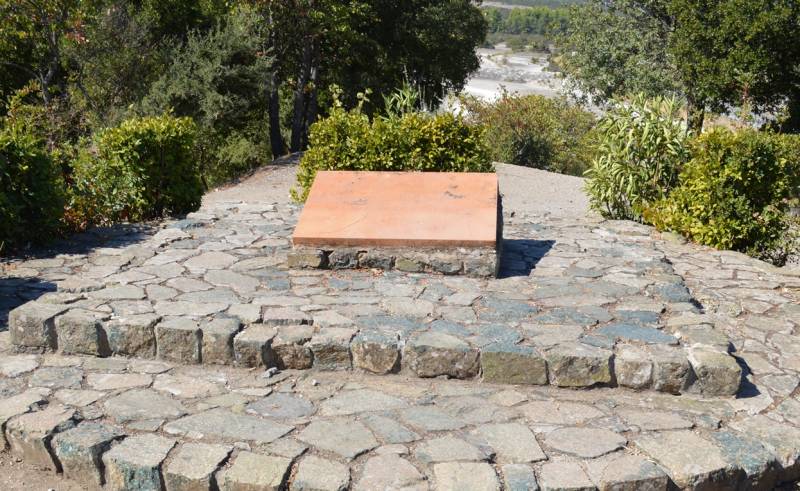
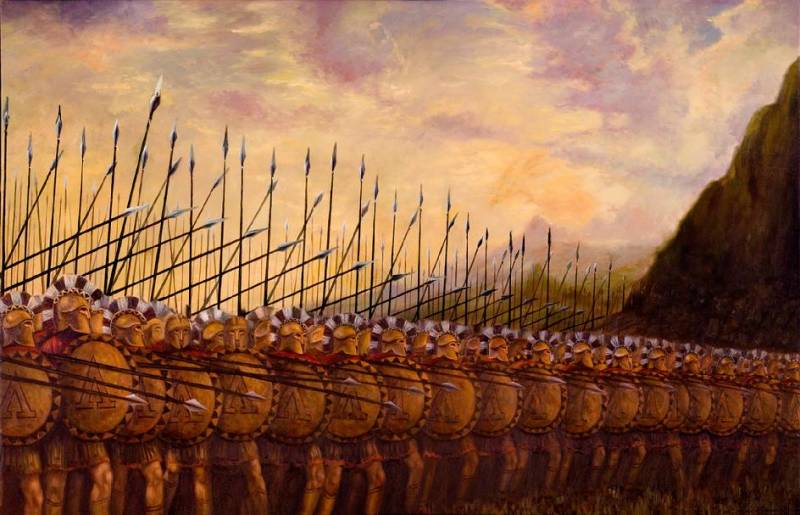
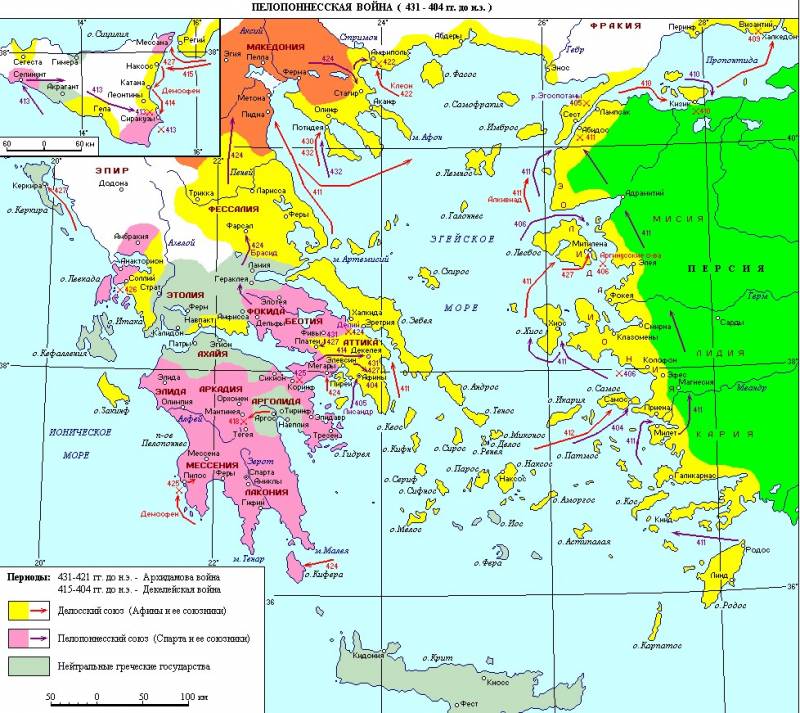
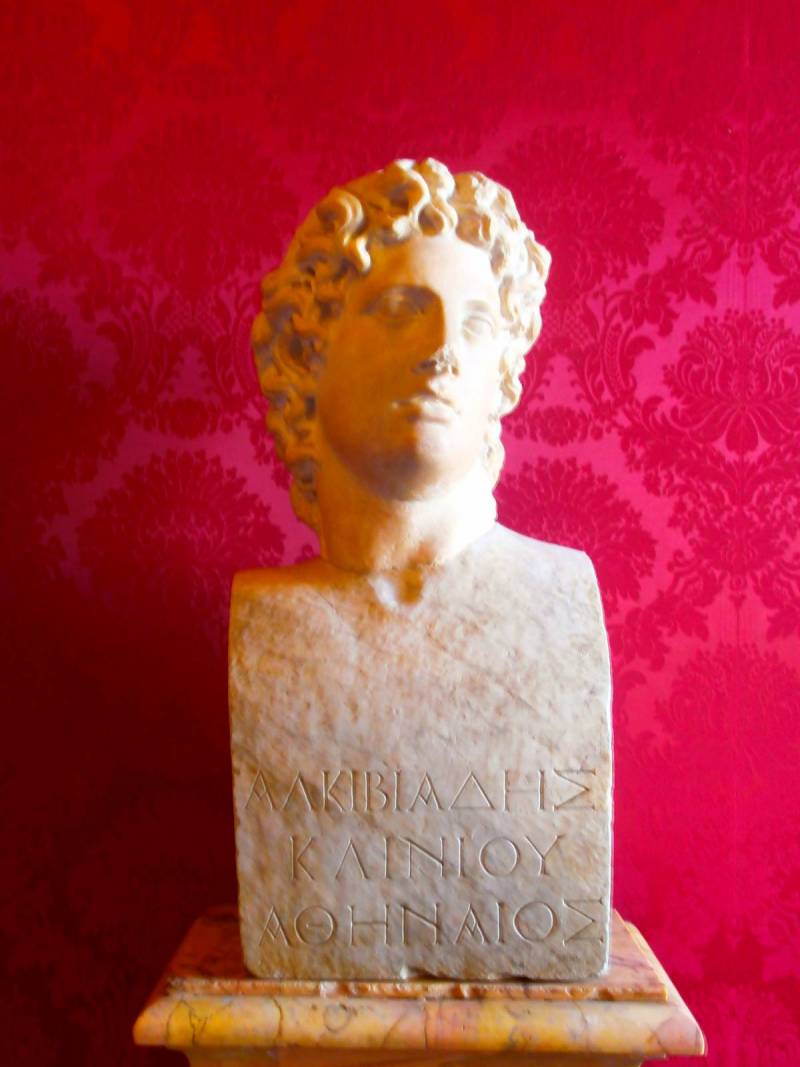
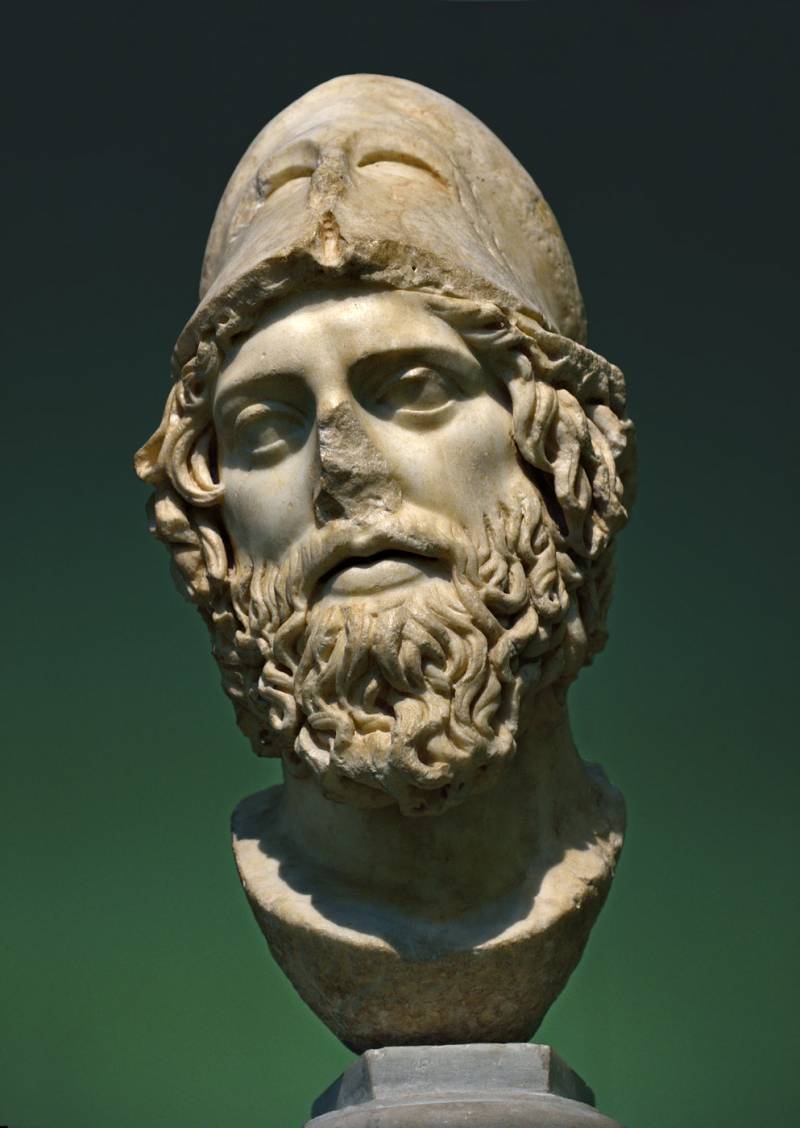
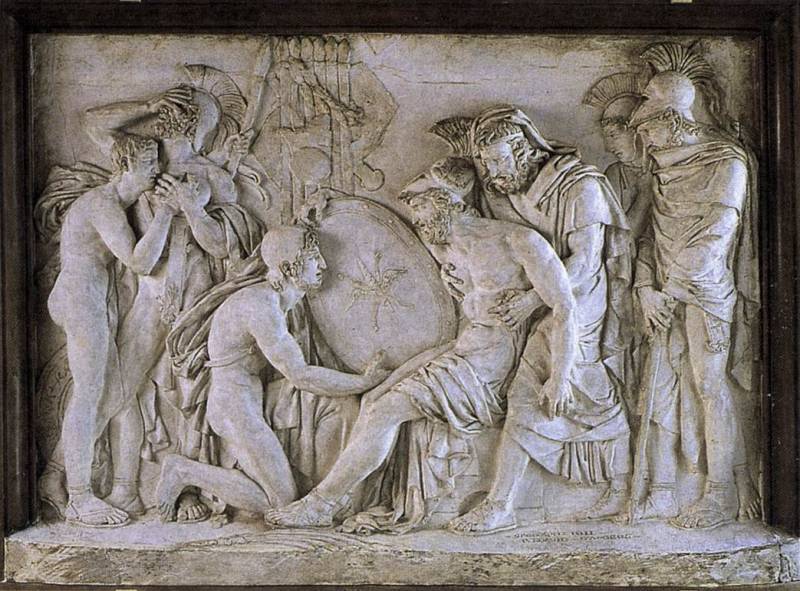
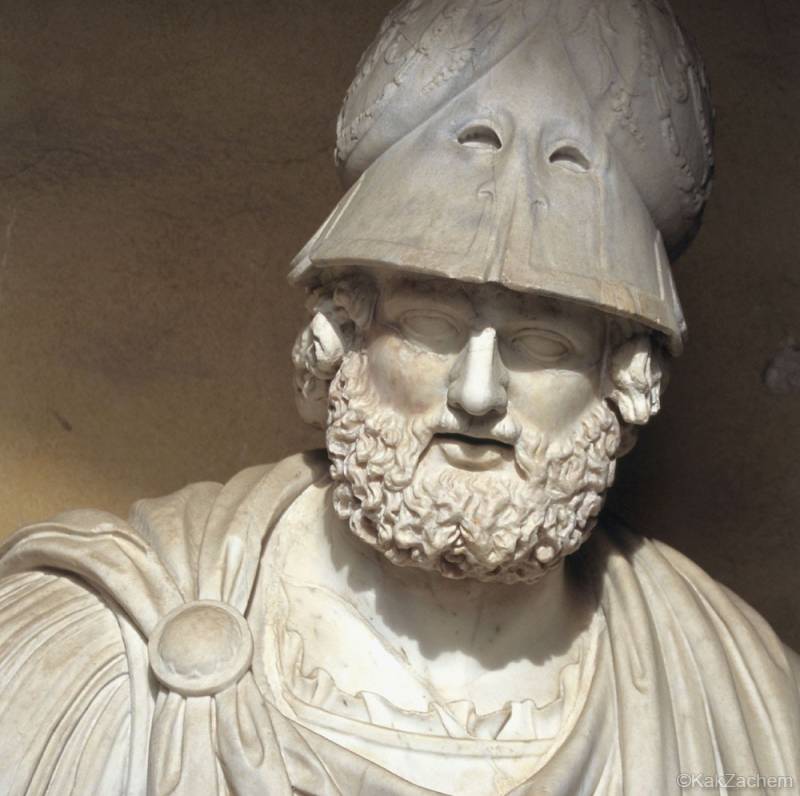
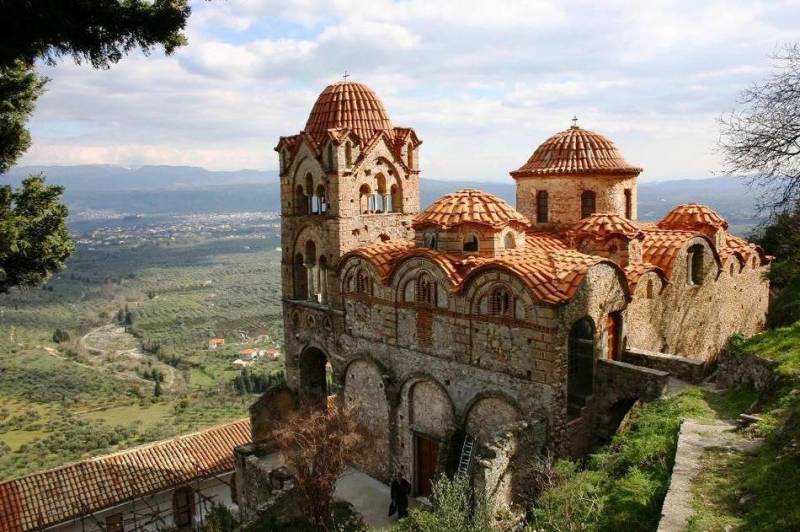
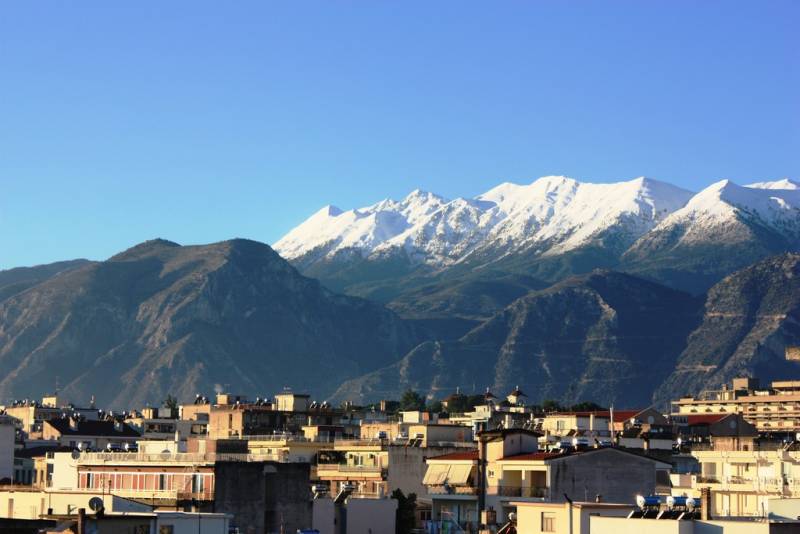
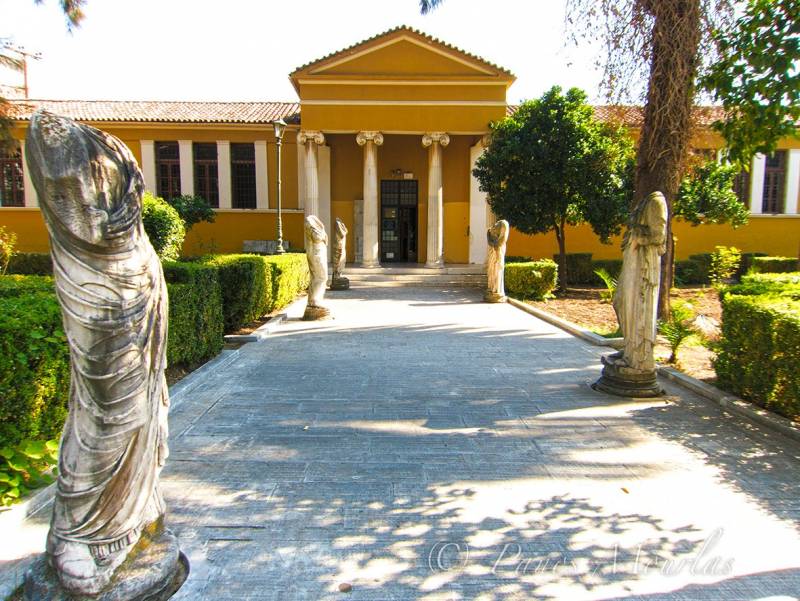
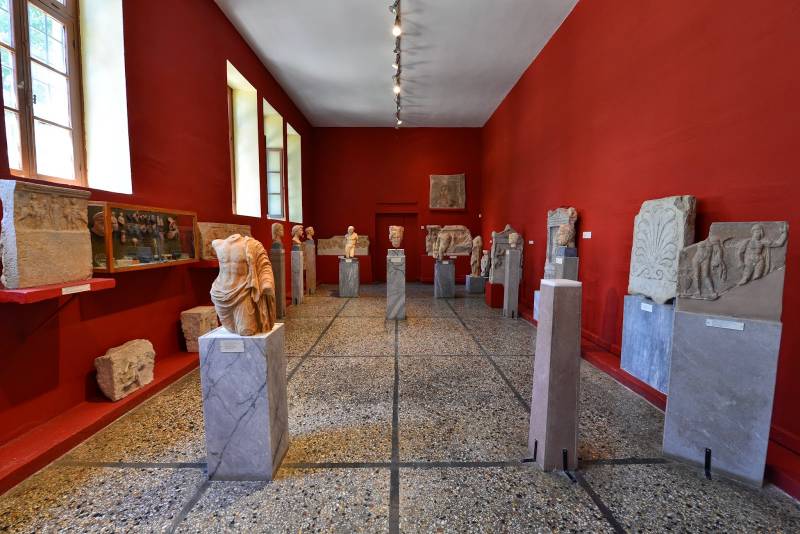
Information